As an Operations Manager, you’re a vital cog that keeps the company running smoothly.
You will face many challenges.
But yet, the first challenge is already here: creating a winning resume.
An operations manager is a serious job that requires a seriously impressive resume. Hiring managers will want to see that you have the necessary skills and experience under your belt, as well as the benefits you will bring to the company.
But don’t be too intermediated. This guide will take you through an easy process that finishes with your very own operations manager resume.
- A job-winning operations manager resume example
- How to write a operations manager resume that gets you invited to interviews
- How to use the latest tips and tricks for an operations manager resume that stands out and highlights your value
Now, before we move on, here’s an operations manager resume sample to spark some inspiration:
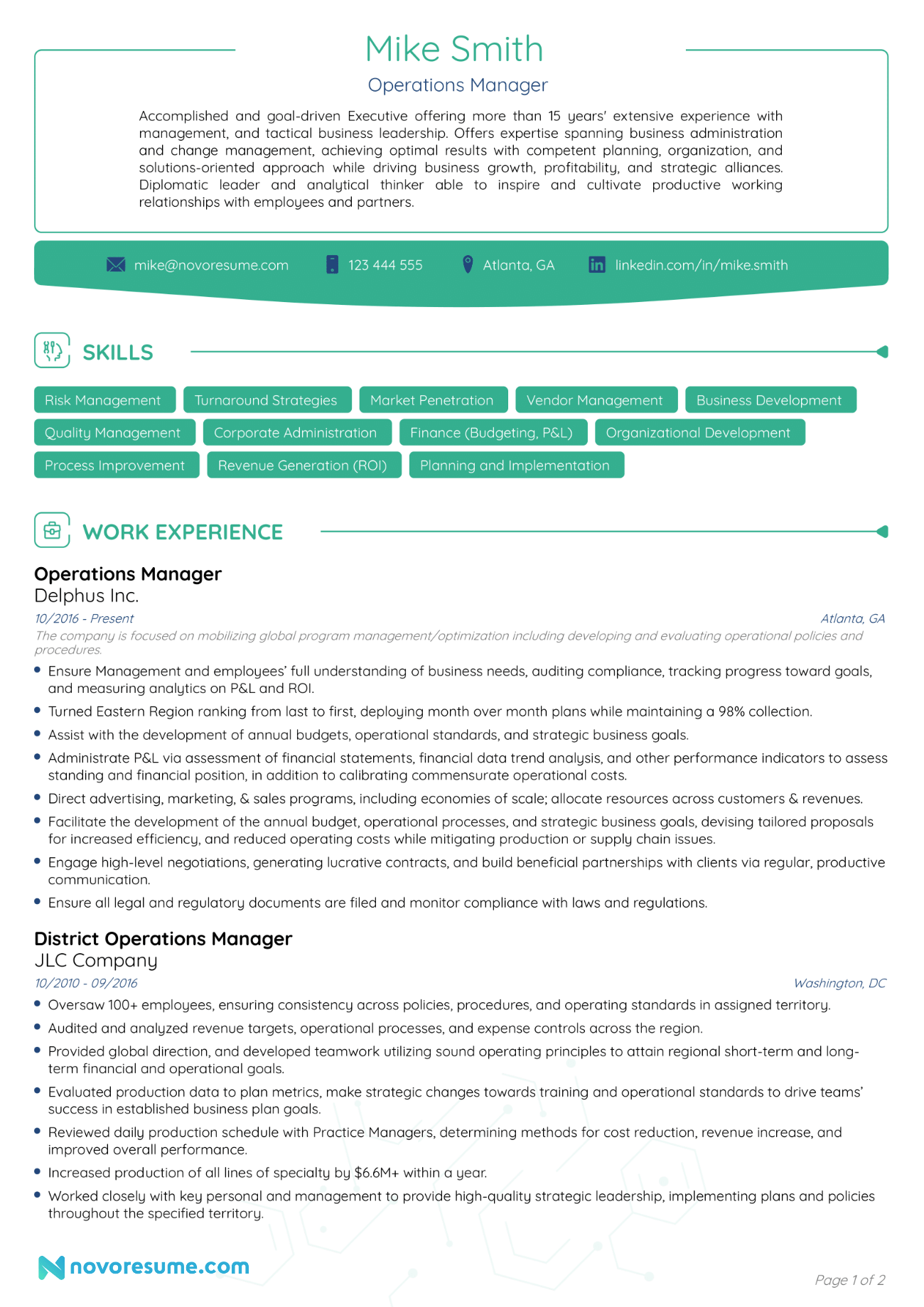
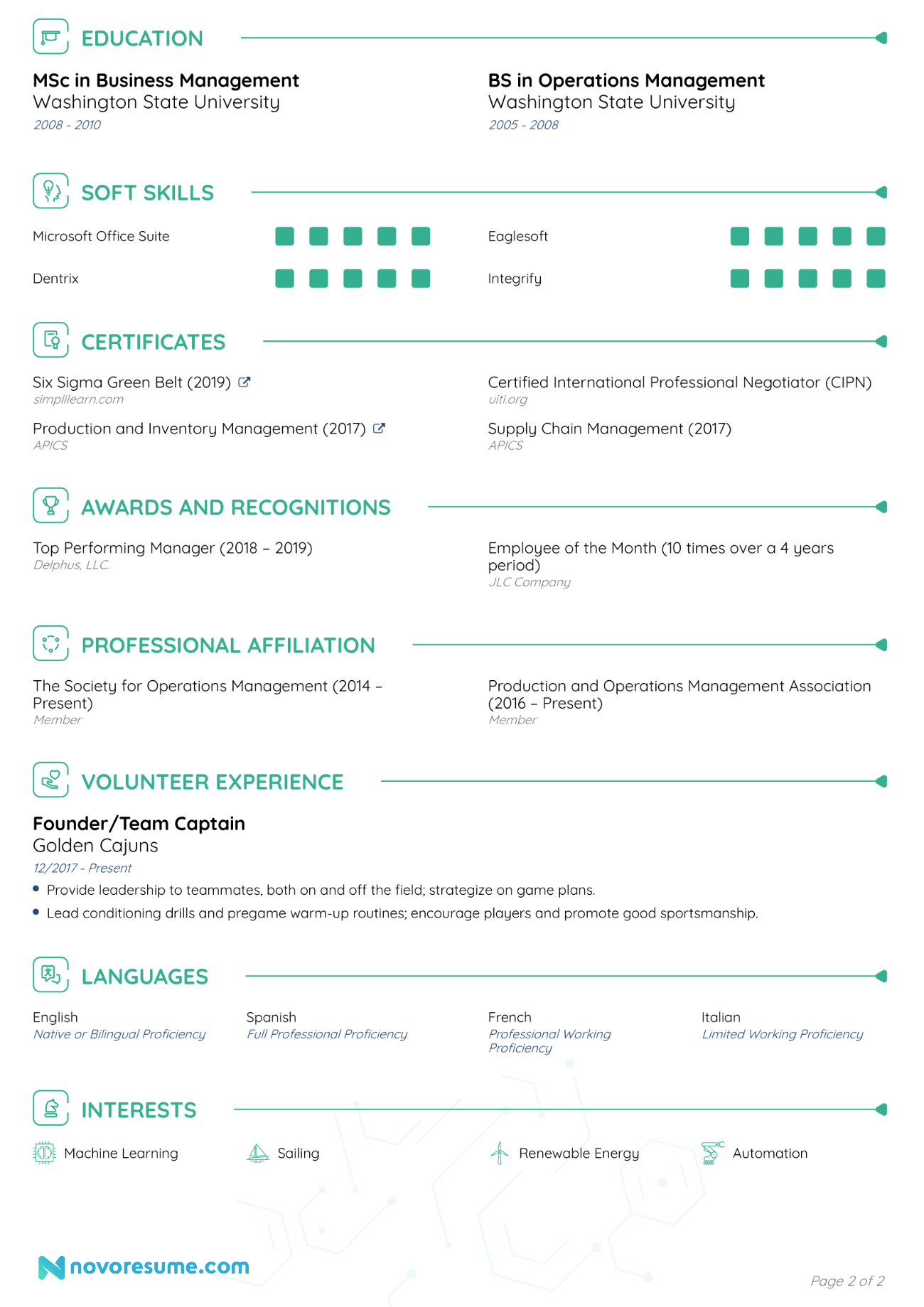
Looks good, doesn’t it?! Read on to find out how to create your very own.
Applying for a different position? We've got more resume examples for you:
- Program Manager Resume
- Office Manager Resume
- Business Development Manager Resume
- Project Manager Resume
- Human Resource (HR) Resume
How to Format an Operations Manager Resume
Before you start talking about all of your top achievements, you need to decide on the formatting.
After all, the hiring manager won’t be hiring an operations manager who has a messy, unprofessional resume.
Currently, the most common resume format for operations managers is the “reverse-chronological” format, which shows your most recent achievements first:
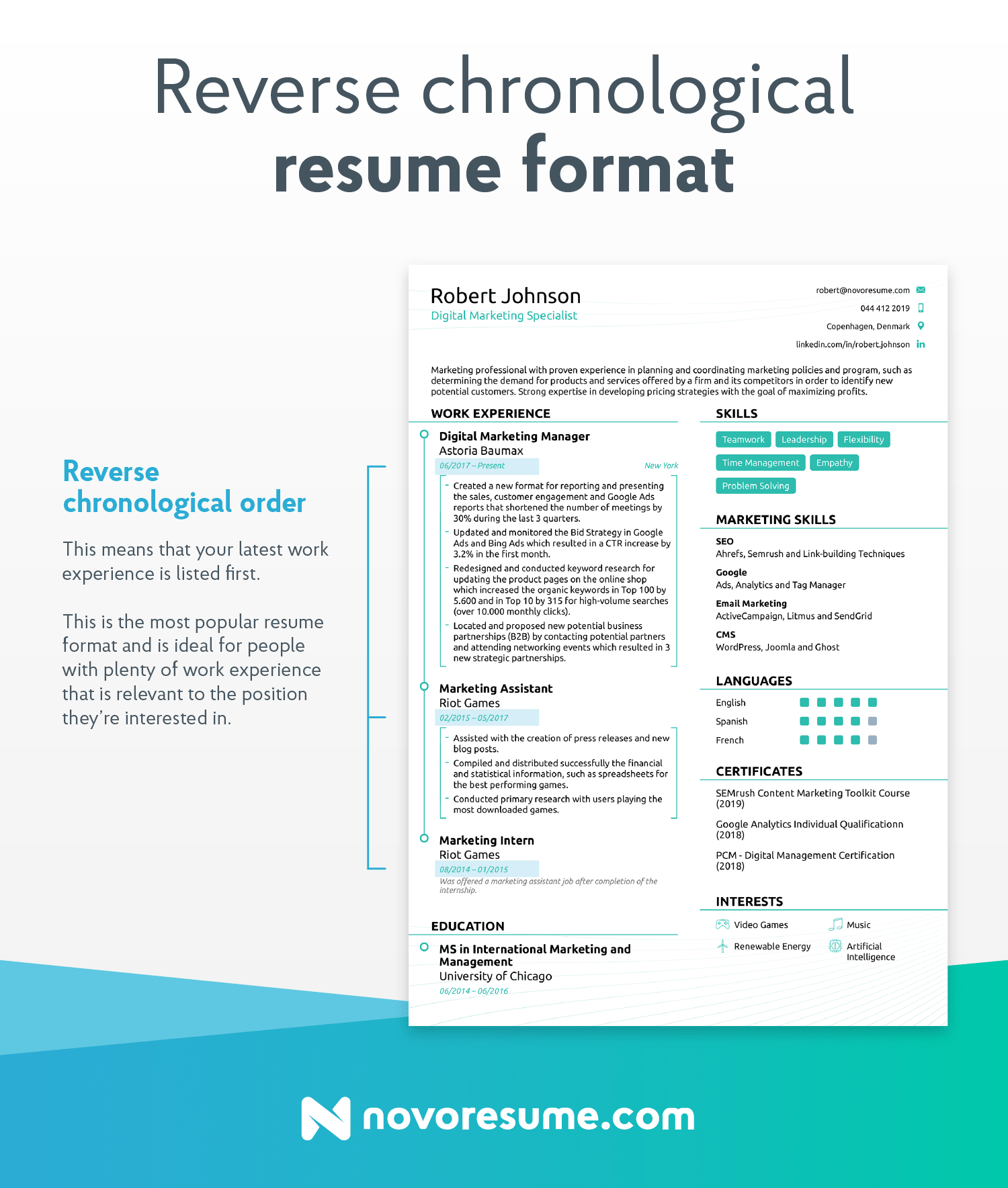
Other resume formats you could try are:
- Functional Resume - This format places a large emphasis on the candidate’s skills, rather than experience. As such, this is the ideal format for those without a wealth of experience or those who have employment gaps.
- Combination Resume - As the name suggests, a combination resume is a mix between “Functional” and “Reverse-Chronological”, which means it focuses both on skills AND work experience. You can use a combination resume if you have a lot of operations work experience or changing industries.
Once you’ve decided on the format, you need to get your resume layout right.
Here’s what we recommend:
- Margins - One-inch margins on all sides
- Font - Pick a resume font that stands out, but not too much. (Do: Ubuntu, Roboto, etc. Don’t: Comic Sans)
- Font Size - Use a font size of 11-12pt for normal text and 14-16pt for headers
- Line Spacing - Use 1.0 or 1.15 line spacing
- Resume Length - Don’t go over the 1-page limit. Having trouble fitting everything into one page? Check out these one-page resume templates.
Use an Operations Manager Resume Template
Ever used word editor to build a resume?
Two words: complete pain.
Although Word is good for general documents, when making a resume, you’ll often find yourself playing with the formatting for longer than it take to actually type the contents.
Then, when you’re finished, you make one change… and BAM! Your entire resume falls apart.
What to Include in an Operations Manager Resume
The main sections in an operations manager resume are…
- Contact Information
- Work Experience
- Portfolio
- Education
- Skills
If you want your resume to stand out more, you can also try these optional sections:
- Awards & Certification
- Projects
- Languages
- Interests & Hobbies
Now, we’re going to go through each of those sections, and explain how to write them.
Not sure which sections to use? Check out our guide to What to Put on a Resume.
How to Write Your Contact Information Correctly
If there’s one thing you need to learn from this guide, it is to not mess up your contact information section.
Although this section doesn’t require any creative flair, it does require one thing: accuracy.
Do it wrong and you risk the company not being able to contact you!
For your contacts section, include:
- Name
- Title - In this case, “Operations Manager”. Make this specific and professional.
- Phone Number – Check this multiple times. One small error can completely blow your chances.
- Email Address - Make sure to use a professional email address (firstname.lastname@gmail.com), and avoid that email you created back junior school (jameslovescats@gmail.com).
- Portfolio Link - Behance, Dribble, or your personal website
- (Optional) Location - Applying for a job abroad? Mention your location.
- David Fakester - Operations Manager. 101-358-6095. dfakester@gmail.com
- David Fakester - Operations Guru. 101-358-6095. davidtheguru@gmail.com]
How to Write an Operations Manager Resume Summary or Objective
Here’s a scary fact - recruiters spend less than 6 seconds looking at each resume.
Essentially, the recruiter needs to see that you’re good for the job in just a single glance!
This leads us to this question….
What can you do to hook the recruiter the moment they look at your resume?
The answer is simple: use a resume summary or objective.
In short, both resume summary and objective are sections that go on top of your resume, just under the contact information section.
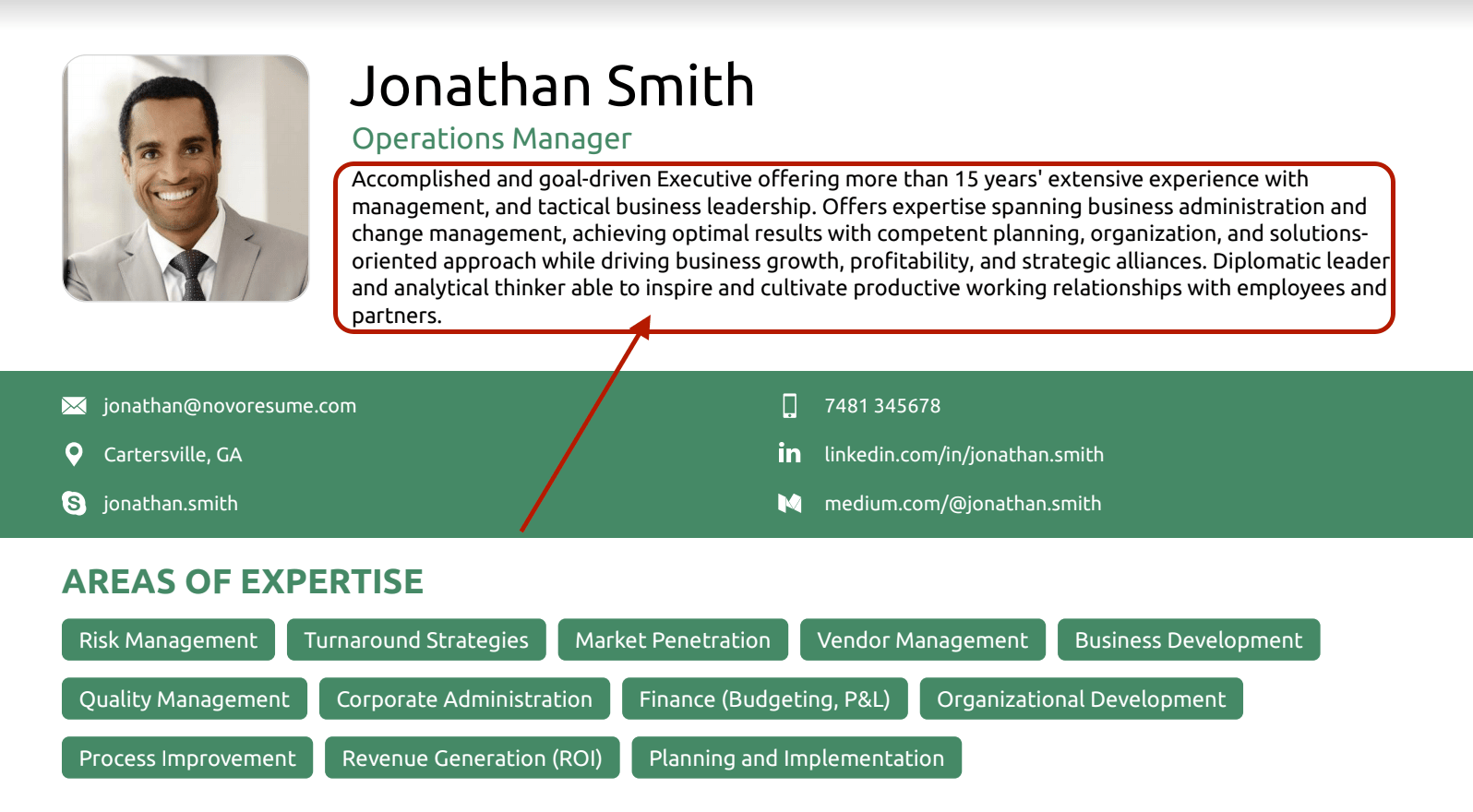
The main difference between the 2 sections is that:
A resume summary is a 2-4 sentence summary of your professional experiences and achievements.
- Detail-orientated operations manager with 12 years of professional experience. At ITX Software, I implemented policy, planning, and strategy to improve turnover by 35% to $2.8million. Passionate about leading operations for Company X, where I can use my skills to improve operations for the benefit of the stakeholders.
A resume objective, on the other hand, is a 2-4 sentence snapshot of your professional goals and aspirations.
- Motivated manufacturing engineering graduate looking for an Operation Manager role at Software Company X. Experience implementing policy, planning, and strategy as part of a team at Engineering Company X. Have a deep understanding of legal documentation, as well as ISO 9001 & ANSI standards.
So, which one do you pick?
Generally, an operations manager is highly-experience, so a resume summary is best. A resume objective is best for those who have not yet worked as an operations manager.
How to Make Your Operations Manager Work Experience Stand Out
Your work experience is the most important section in your resume
Sure, your skills and education are both important, but nothing shows your value like a wealth of relevant experience.
Here’s how to structure your work experience section…
- Position name
- Dates
- Company Name
- Responsibilities & Achievements
Operations Manager
Manufacturing Xcel
01/2013 - 06/2019
- Reduced headcount by 8%, whilst increasing productivity by 23%
- Exceeded gross profit goals for six years in a row
- Developed safety programs for a 60% decrease in accidents
- Grew company market share by 16% in my first year]
As you can see, the example focuses on achievements, instead of daily tasks. This one change will massively separate your resume from the competition.
Don’t say…
“Oversaw productivity”
Say…
“Reduced headcount by 8%, whilst increasing productivity by 23%”
So, should you do this?
Well, the first statement doesn’t mean much. Sure, you oversaw productivity, but you can’t tell whether you were successful or not.
The second statement is more specific and data-driven. It screams “I’ll be a valuable asset to your company”.
Use Action Words to Make Your Operations Manager Resume POP!
- “Responsible for”
- “Created”
- “Worked in”
I challenge you to find a resume that doesn’t include these words.
And since your resume needs to stand out, we’d recommend avoiding these words where possible.
Instead, throw in some power words to emphasis your responsibilities and achievements:
- Conceptualized
- Designed
- Devised
- Determined
- Drafted
- Formulated
- Introduced
- Initiated
- Launched
- Originated
- Spearheaded
How to Add a Portfolio to Your Resume
The portfolio section is added is the same way as the education section.
First, create a header named “Portfolio”. Under this header you should link to your website (or Behance / Dribble), and then list the history of your work projects.
Portfolio
www.jamesneil.com
- Computer Database Client X – Created a computer database system for Client X, which boosted efficiency by 35%
- Management Forum for Client Z – Created a management forum for Client Z, which boosted staff retention and morale]
If you don’t want a whole section for your portfolio, just insert a link to your online portfolio in your contact information section.
How to Correctly List Your Education
After your experience comes your education.
This is simply a case of listing your education in the following layout:
- Degree Type & Major
- University Name
- Years Studied
- GPA, Honours, Courses, and anything else you might want to add
B.A. in Manufacturing Engineering
Boston State University
2014-2018
- Relevant Courses: Blueprint Reading, Technical Writing, Industrial Safety, Computer Programs, Manufacturing Tool Design, Manufacturing Process Design and Analysis.
- GPA: 3.4
Before we conclude this section, here are some of the most frequent questions we get about education in regards to an operations manager resume (and their answers):
What if I haven’t finished studying?
- Whether you’re still in education or not, you should still mention your degree and all courses. Simply include all of the years studied
Is it worth listing my high school education?
- Only if that is your highest form of education. It’s worth noting that the hiring manager won’t care about your high school education if you have a relevant degree
What goes is listed first, education or experience?
- Work experience goes on top, always. If you don’t have any real experience, then that should go first.
Still have some questions? Check out our guide on how to list education on a resume.
Top 9 Skills for an Operation Manager Resume
When the hiring manager is looking over your resume, they want to see your skills and abilities.
You see, hiring managers usually have a checklist of required skills. If you don’t list your skills, the hiring manager will likely put your resume straight into the “no” pile!
Need some inspiration?
Here are some of the most common and desirable operations manager skills:
Hard Skills for Operations Manager Resume
- Implementing policy, planning, and strategy
- Overseeing budgeting, reporting, and auditing
- Understanding legal and regulatory documents
- ISO 9001 & ANSI Standards
Soft Skills:
- Communication
- Negotiations
- Team building
- Leadership
- Stress tolerance
- There’s no way around it, soft skills are incredibly important for an operations manager. However, try not to go overboard when listing them. You see, they have less power in your resume as they are less verifiable.
Looking for a more comprehensive list? Here’s a mega-list of 150+ must-have skills.
Other Resume Sections You Can Include
By now, your resume should really be coming together.
But wait!
Remember that the #1 goal of your resume is to beat the competition.
A resume that looks the same as the others simply won’t cut it.
With a competitive job, these following sections could be the deciding factor in whether you or another applicant is hired.
Awards & Certifications
Did you win a university competition?
Have you completed operations-relevant courses on Coursera?
If you have anything that you’re proud of, definitely mention it inside your resume!
- Improving Communication Skills - Coursera Certificate
- Learning How to Learn - Coursera Certificate
- Supply Chain Operations - Coursera Certificate
Personal Projects
Are you passionate about all-things operations?
Well, fantastic! That’s exactly what your future place of work wants to hear.
Showing the results of a project is one of best ways to show your passion.
Whether it’s a university class project or a personal side project, the hiring manager would love to know more.
Here is the type of projects you could mention:
- Managing your own small-scale business project
- At university where you managed a team project
Languages
Although unlikely to be on the job description, being able to speak multiple languages is a skill that could always come in handy.
Besides, it’s just impressive, isn’t it?!
As such, add every language that you can speak to your resume (if you have space).
To keep everything organized, split the languages by proficiency:
- Native
- Fluent
- Proficient
- Intermediate
- Basic
Interests & Hobbies
Now, you’re going for the job of operations manager, so why are we suggesting you to talk about your interests and hobbies?
Well, it makes you more relatable.
In a world where applicants are hiding behind their qualifications, don’t be afraid to show your personality.
Not sure which hobbies & interests are relevant or suitable? We have a guide for that!
Match Your Cover Letter with Your Resume
Oh here we go - more writing!
But please bear with us, as a cover letter is extremely important.
Covers letters show the hiring manager that you have a passion for working for this exact company, not any company that will pay you.
By writing a cover letter, you are automatically putting your application to the top of the pile.
The first step to writing a convincing cover letter is to get the structure right. Here’s how to do that:
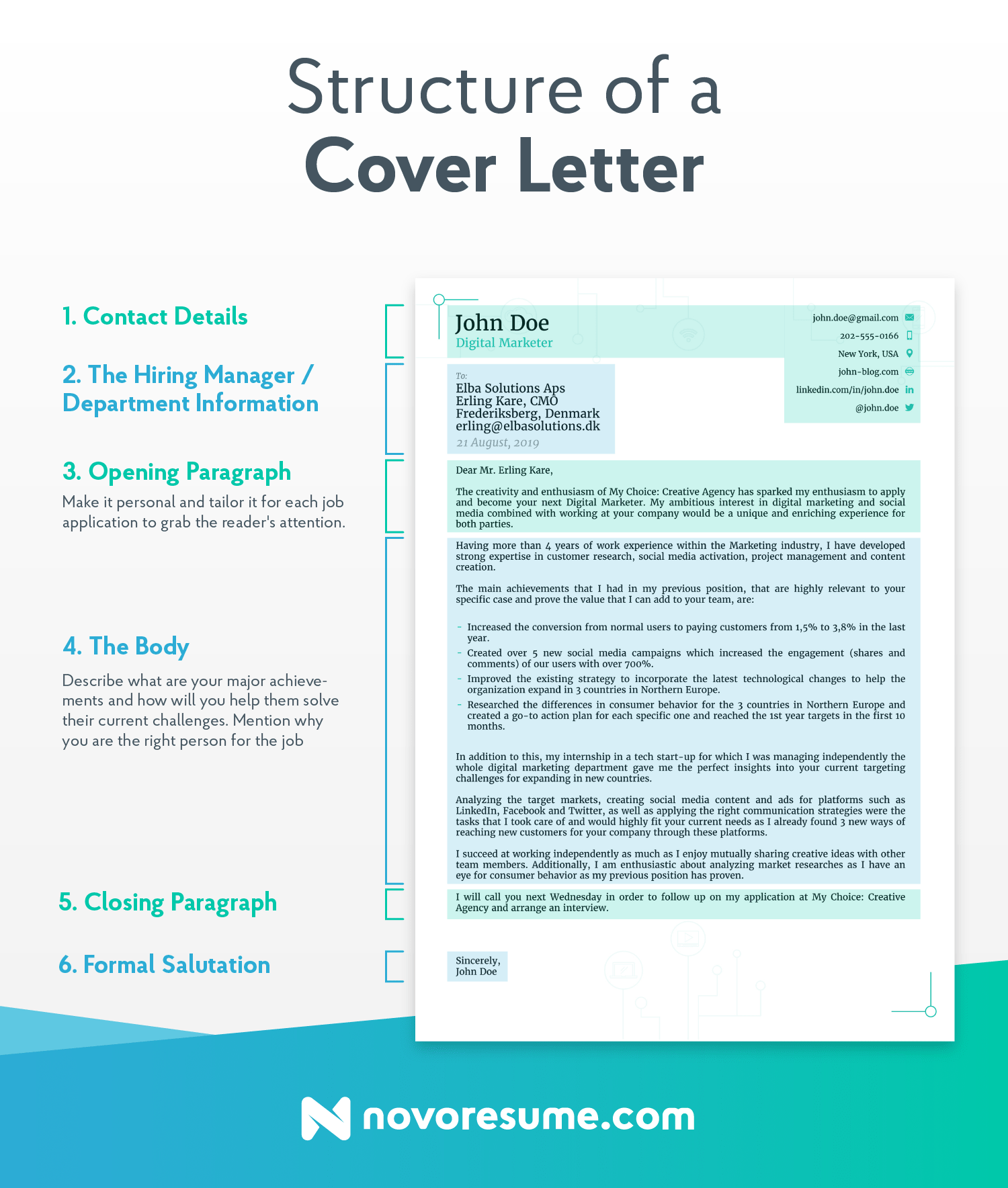
And here’s what you’d write in each section:
Contact Details
- Your personal contact information, including full name, profession, email, phone number, location, website (or Behance / Dribble).
- Hiring Manager’s Contact Information - Full name, position, location, email
Opening Paragraph
Your introduction should be very strong. If you don’t manage to hook the hiring manager here, chances are, they’re not going to read the rest of it. So, mention:
- Your name
- The position you’re applying for
- Your experience summary and top achievement
The Body
Once you’ve got the hiring manager hooked, you can go through the rest of your background. Some of the points you can mention here are:
- Why you want to work for this specific company
- Anything you know about the company’s culture
- What are your top skills and how are they relevant for the job
- If you’ve worked in similar industries or positions
Closing Paragraph
This is where you:
- Summarize the main points
- Thank the hiring manager for reading
- End with a call to action to continue the dialog, like “I’d love to further discuss how my experience as an X can help the company with Y”
Formal Salutations
Use a formal closing, such as “best regards” or “Sincerely.”
If you’re still not confident, please view your step-by-step guide on how to write a cover letter.
Key Takeaways
Congrats!
So, now you know how to create an operations manager resume that works!
Now, let’s have a quick rundown:
- Nail the formatting on your operations manager resume. We recommend using the most popular format: reverse-chronological.
- Stand out by using a resume summary or objective
- Try to talk about your work achievements rather than your daily responsibilities.
- Match your operations manager resume with a well-written cover letter.


